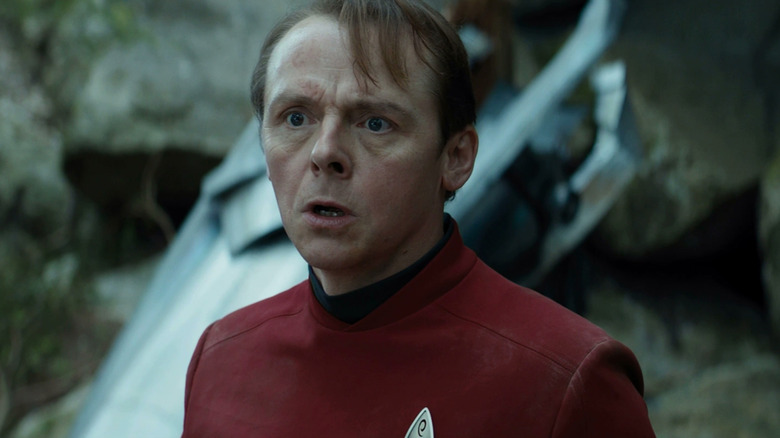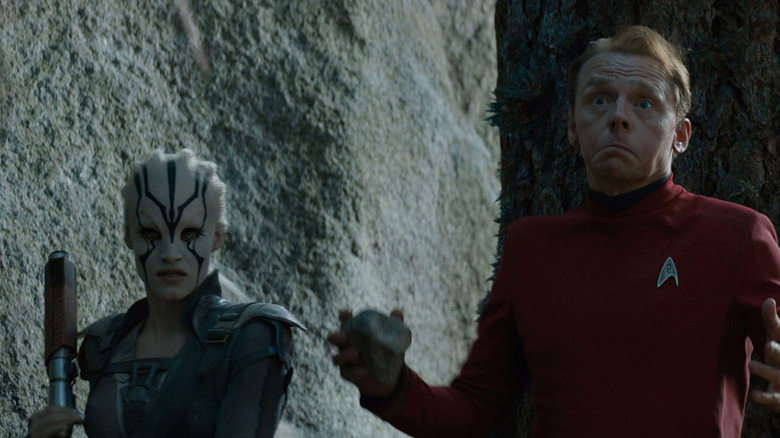Simon Pegg Wants The Next Star Trek Movie To Avoid This Common Sci-Fi Mistake
The most recent "Star Trek" movie, "Section 31," was released on Paramount+ in January of 2025, disappointing Trekkies and non-Trekkies alike. Director Olatunde Osunsanmi tossed together a colorful, action-heavy, ostensibly lighthearted caper film that felt as far from the core tenets of "Star Trek" as the franchise has ever strayed. Prior to "Section 31," the last Trek film audiences saw was "Star Trek Beyond" in 2016, the third (and final?) film in the alternate Kelvin timeline. The Kelvin timeline, as Trekkies can tell you, was a parallel universe within "Star Trek" wherein the familiar crew of the U.S.S. Enterprise were all played by newer, younger, hotter actors.
Simon Pegg replaced the late James Doohan as Scotty, the Enterprise's stalwart engineer, and he brought a great deal of nerdy verve to the character. Pegg has written a memoir about his youthful pop culture obsessions, so he was pleased as punch to be associated with "Star Trek." Indeed, when it came time to make "Star Trek Beyond," Pegg even co-wrote the screenplay (with Doug Jung). "Beyond" stands above its immediate Kelvin prequels in that it's not quite as dark and aggressive, even if it is still action-forward. "Beyond" wasn't quite as big a hit as its predecessors either, though, and it effectively ended the Kelvin movie series. Paramount has said as recently as May of 2024 that a fourth Kelvin film is still in development, but I think most Trekkies are in a "We'll believe it when we see it" mindset.
Simon Pegg commented on the future of "Star Trek" movies in a recent Variety video interview, where he said that whatever the next "Star Trek" movie is, he would prefer that the filmmakers stay away from the tired trend of making it "gritty" or "dark." Those things, he correctly surmises, are not the same as "mature."
Please don't make Star Trek gritty
As mentioned above, the first two Kelvin-era "Star Trek" movies — the ones directed by J.J. Abrams in 2009 and 2013 — did indeed adhere to a "gritty" ethos, steering sharply into violence, and eschewing the more traditionally philosophical "Star Trek" tone. They, unlike the Trek movies that came before them, were very action-oriented, and featured more fighting and destruction (especially "Star Trek Into Darkness").
Of course, "grim and gritty" or "dark and edgy" became critical buzz-phrases sometime in the mid-2000s, when multiple older pop properties were being explored in a more adolescent fashion, adding a stern, po-faced tone and dark elements of violence to characters that had previously been light and fun. Some examples of this include 2004's "King Arthur," 2005's "Batman Begins," 2006's "Casino Royale," 2007's "Halloween," and the gradual darkening of the initially lighthearted "Harry Potter" movies. "Star Trek" got the same treatment in 2009. This darkening of light material was essentially a way to allow adolescents to enjoy stories that were conceived of as kid-friendly.
"Star Trek," as Pegg argues, isn't childish, but there was a general perception that making it "gritty" would someone make it more serious:
"These days, everything becomes very gritty. And I think it's this weird kind of justification of 'How do we make this thing, which is essentially quite youthful?' Although I would argue that the original 'Star Trek' series wasn't childish. It was actually quite sophisticated. Things don't have to be gritty and dark to be for adults."
Indeed, they just need to be intelligent. Gentle can be more mature than violent. Although Pegg likely he saw what Abrams did with "Star Trek," he was also likely aware of the more violent "Star Trek" TV shows that have debuted on Paramount+ since "Star Trek: Discovery" debuted in 2017. The push to make things more violent has only continued unabated.
Things don't have to be gritty and dark to be for adults
If the "Star Trek" movies are going to continue, Pegg feels that they should be, in his words, thoughtful and imaginative ... and not violent. He was a fan of the original "Star Trek" series from 1966, and wants to recapture that spirit. "Star Trek" is, after all, about pacifism. One doesn't need to kill characters and destroy ships in order to raise the stakes, nor does one need to have a revenge-obsessed villain to make a compelling story. In Pegg's words:
"Science fiction doesn't have to be full of death and swearing and questionable morals to be consumed by adults. It just has to be thoughtful and imaginative. I'd like to see 'Star Trek' kind of get back to the spirit of the original series a little bit. And get out there on that five-year mission, although we've completed our five-year mission. So if we did another one, it'll be interested to see what we do next."
Indeed, if Abrams "Star Trek" came out in 2009, and "Beyond" was in 2016, then it's already been a seven-year mission.
No one knows what "Star Trek" movie will be made next, or if one will be made at all. Several Trek movies seem to be in development, but nothing is on the immediate horizon. Paramount+ is currently working on a TV series called "Starfleet Academy," and the next season of "Star Trek: Strange New Worlds" will debut in July. That show, at the very least, has something of the spirit of the original.


